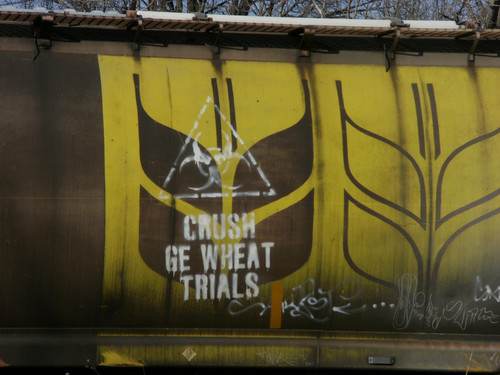I've been thinking about the symbols of Christmas and how we imbue certain days of the year with our values and expectation, even long past the days when we were rooted in the earth and celebrations were about the produce and the work that arose from them. The importance now is in the celebrity and symbolism of the day.
It reminds me of how we create and empower celebrities or leaders give them significance or infamy from a deep sense of human want or genetic memory. They are like our hedge funds or stand in for our values and our expectations. We create them and can live through them but they disappoint as quickly as they resound, because their symbolism shatters in the surfacing of their humanness. A deeper longings for belonging or wholeness has us entrust power to people as readily as we attach a symbol to a day. Leaders and celebrities come crashing down and pile up like christmas wrappers and heaps of dry tinseled trees.
I've known many food activists who have come to symbolize the voice of farming. They are in every city and have done honourable work in bringing forward the issues of food security. These are predominantly urban people whose detachment from the reality of farm culture is also evident in many of the projects: co-ops turned to businesses, endless grants without actual projects of the soil, policy change in favour of the next opportunity, food conferences and committees that farmers had no voice in. We have created this reality by giving over farm voices to a few, predominantly urban, cultural celebrities. We need these voices. But we need more farm voices. There are a few: Bove, Percy Schmeizer, Wendell Berry. The list is short, because the message is often one of desperation and urgency. Real issues pertaining to farming livelihoods like price and import controls, legal representation for right to farm or coexistence issue are virtually champion less. For a really dynamic local sustainable agriculture it is time to unravel the substance from the symbol. "Our culture today is mainly embarrassed about country things. we need to ask What is the nature of this place? And then: What will nature permit me to do here? Consideration of these questions might have led us to recognize the inherent economic connections between country and city, between what is grown and what we eat, between what natural resources are available and how they are consumed—and to accept and act on the responsibilities that those connections imply." source. The voices of those that struggle are often unruly, uncomfortable and of a different cultural milieu. Class plays a part.
It is a fabulous time for the celebrities of the organic/ sustainable farming movement to bring forward the voice and needs of the farmer they so often symbolize, to honour the dependency of urban existence to the primary producers out on the land. Not to speak for them, but to work for them. The opportunity of a special holiday is to stand back and reflect upon what our symbols mean. To connect that turkey with the goal of not just good healthy food, but with good healthy farmers on good healthy land. Every person, rural and urban, needs to come to the table to empower our food future and it is something well worth celebration. It is a connection of great magnitude and tremendous possibility.
December 23, 2008
Subscribe to:
Post Comments (Atom)



6 comments:
I read the book review of "Conversations with Wendell Barry." I found this line of the review very interesting: "It is also telling that as early as 1973 Berry was advocating using composted human waste as fertilizer." I am one of those urbanites who has uncritically bought into the idea that such a practice is revolting but obviously I am way behind the times on this one. What do you know about this practice?
Hey Isabelle, perhaps the innuendo here is that post is a little full of....humanure..,perhaps its over the top.
In regard to the less symbolic stuff... sewarage is another term I've heard, they have been using it as fertilizer on forage crops in a large scale, industrial way in N.A for "fertigation" I heard that Hospital waste is spread on sod farm here in the valley....I'll find a link.
In Asia its been an important component of fertilization. I too am squeamish about the practise, especially for table crops, and think the practise takes a skill and care to ensure the destruction of all pathogens and the absence of toxins from other household products that can build up in the soil... that can't be adequately guaranteed. I've used compost from a composting toilet on flower gardens and certainly would again. Farmers of 40 Centuries; King, describes the importance of human waste in traditional food production in China.
Such an eloquent writer, your ear of obviously open to the knowledge of nature, you have truly hit the nail on the head with this one!
p.s. i think poop from people in general is toxic, full of chemical and pharmaceuticals showing once more how absentmindedness has created a naivete of how things really work in nature
happily in nature poop comes from the soil and it goes back to the soil
Merry Christmas and Peace for All
Hi RRose
I think "preachy" may be a better description than eloquent, but thanks.. it was certainly hard to write. The humanure parallel is a good - how far we've separated from the ecology of our natural functions; a disconnection from consumption and its impact. We have set ourselves apart from nature and basic skills of living in her. Like the impoverished, isolated dirt farmer bullied by regulations - what we have given up for industrialized agriculture is unpleasant to think about, partly because we are complicit in it. It irritates me that the message has to be sweeter, groovier ...but perhaps, given these times, will be born of necessity.
Hard to see how anyone who cares about food (grower and/or eater)could take exception to what you're saying here. How would you see it actually happening?
Moe
Hi Moe, that seems like a opic for another post...oh yeah! Briefly:
1. ensure inclusion of farmers in significance in all food conferences, committees, decisions, etc , whatever it would take to do that)
2. Direct trade policy protect farm and food security over corporate interest (e.g. - establish anti-dumping regs.)
3. Link urban and rural communities through well funded youth and community projects - utilize grant monies for actual projects (gleaning, farming skills, reclaimation of marginal farm land..etc)
4. Offer agricultural scholarships to young people who volunteer for a period of time on established farms
5 Set up a registry of farms and people who wish to farm and fund land transition and knowledge exchange through loans/ community mortgages.
6. Have a rural channel on TV that brings the issues of the hinterland in an interesting, dynamic and daily stream.
7......
Post a Comment